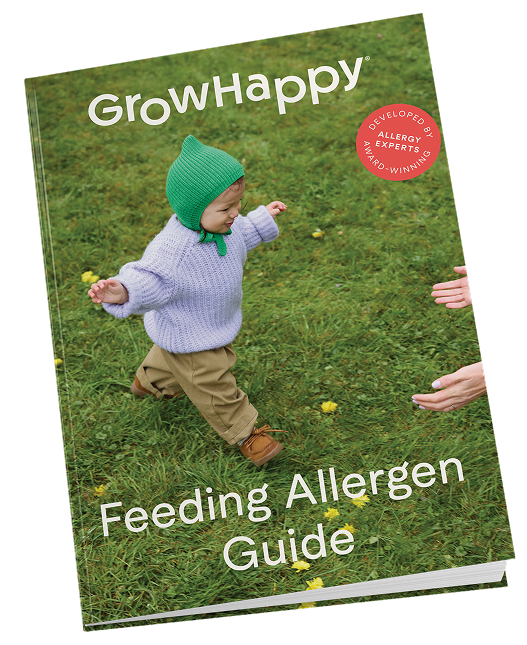Many experts believe that food allergies start when a child is exposed through broken skin commonly seen with eczema, which 1 in 3 babies have to some degree. Instead of being eaten and teaching the immune system to become tolerant, the allergen enters the body the wrong way via the skin and the immune system learns to fight that allergen like an enemy. This goes back to when our skin needed to protect us from real enemies like bacteria, for example when we bathed in dirty rivers. The immune system learns to go into overdrive unnecessarily whenever it sees that allergen through the skin. That’s why our goal is to get those allergens down the GI tract as soon as the baby can eat solids to teach the body that this is just food! No need to go into overdrive!
Eczema is part of the same allergic disease family as food allergies and asthma. 75% of food-allergic children have eczema prior to developing food allergy. If your child has eczema, he or she has a higher chance of developing food allergies, but don’t let this stop you from getting proactive Early & Often™. Instead let it motivate you to get in there, take control, and prevent the allergy before it has a chance to take over. Talk to a pediatric allergist about how to introduce allergens safely with eczema and teach the immune system that food is safe by feeding allergens Early & Often™.
You also may want to see a pediatric allergist for diagnosis, treatment, and advice on how to control it.
If your child has eczema:
-
Your child is at higher risk of developing a food allergy. Fight the fear and let this motivate you to protect your child by introducing allergens to the gut in the first year of life from 4-6 months old and keep them in the diet. At this point, feeding allergens Early & Often™ is the easiest and most effective way to find food freedom that studies have shown.
-
If your child has eczema that is early onset, persistent, severe, and slow to respond to treatment, these patients carry a higher risk for food allergy. In these cases, you may want to see an allergist to discuss food allergies before introducing any major allergens.
-
Talk to your allergist about applying Vaseline to the eczema (especially on the face) before feeding
-
Seek a pediatric allergist for advice on how to control the eczema and get allergens in safely
Through the skin allergies may begin; through the diet, allergies can stay quiet!









